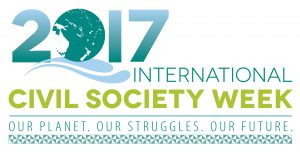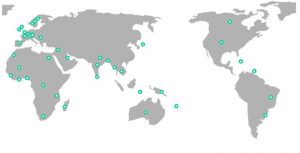
From 14-16 November 2017, INTRAC with ICD, Peace Direct and YCare International ran the first ever Virtual Event as part of International Civil Society Week (ICSW) 2017. Over 120 people from all over the world and many types of organisation joined the live webinar and online discussion forum during the three days.
We came together to inspire international NGOs, intermediary organisations and funders to rethink how they support the independence, credibility and sustainability of civil society; to inspire CSOs to push for changes in partnerships and look beyond external funding.
Listen to the full webinar recording to hear presentations from CIVICUS, the Caribbean Natural Resources Institute (CANARI), Maliasili Initiatives and the Ford Foundation. Contact us to access written contributions from KEPA, Peace Direct, Foundation for Civil Society (Tanzania), Global Fund for Community Foundations (GFCF), PHASE Nepal, CHS Alliance, Participatory Research in Asia (PRIA), the UN Resident Coordinator for Papua New Guinea, and many more.

The gap between rhetoric and reality in ‘partnership’ has long been an issue within the aid system. Politics and power, too often related to control over the money and therefore control over the agenda, continuously hinder the prospects for systems-wide change in attitudes and approaches. This does not mean that this generation, right now, should not strive for a new direction. The times in which we live demand this, as Jenny Hodgson from GFCF emphasized:
“As governments around the world crack down on civil society one of their main – and easiest – arguments is to question the “legitimacy” of those that receive funding from “foreign” donors. Unless more is done to build local constituencies, supporters, champions – including local donors – civil society will continue to find itself vulnerable to such onslaughts.”
However, there is a growing number of organisations that are trying to do things differently. CSOs, such as CANARI, that are developing their own principles by which to judge whether partnership with international organisations will be in their best interests. International NGOs that seek to strengthen rather than undermine local organisations in their ways of working, including better exit planning to ensure sustainability of impact long after they have withdrawn financial assistance. Funders that are supporting alternative resource mobilisation strategies for grantees.
INTRAC’s Chief Executive, Helen Mealins, stressed the importance of promoting innovative solutions and building momentum for fundamental change: “That is why INTRAC has put sustainability at the heart of our mission”, she said.
Mobilising local funding…
CSOs need to take more action to mobilise local resources. This was a strong message coming through from participants based in the global south:
“It is high time for the CSOs to begin planning for the kind of projects that are well within their ability rather than planning for projects and depending on resources from elsewhere or from abroad. I think this way we can be in a position where we can maintain freedom and do things that we really want to do.” (Elias Xavier, independent consultant, Tanzania)
Everyone agreed that fundraising is not easy wherever you are, especially for rights-based and politically-sensitive activities, but CSOs need to find ways to diversify their resource base if they are to avoid dependence on external funders. This requires a shift in mind-sets to develop and embed different practices. It requires CSOs to “be ready to say no”, as Nicole Léotaud from CANARI stated, and to build up their local constituencies. It requires INGOs to take a long hard look at their actions in practice, including whether their fundraising activities in the global south compete unfairly with local organisations. It requires funders to take risks with supporting national intermediaries and to provide funds in ways that enable organisational development.
“In some of the most difficult social, political and cultural contexts, it is often vital for donors to support small, incremental steps that help to build the foundations for bigger more transformative changes in the future.” (Roy Trivedy, UN Resident Coordinator and UNDP Representative, Papua New Guinea)
…. while maintaining global connections
The SDGs, the Grand Bargain and other global dynamics offer opportunities for civil society engagement; and civil society is crucial to ensuring that these processes deliver on global commitments to leave no-one behind. Our desire to ensure greater independence of civil society in the global south is not a call for reducing partnerships. Partnerships are vital for advocating for change from the local to the national to the international level and vice versa. What we need are more constructive relationships as Esther Meester from the Wilde Ganzen Foundation suggests: “perhaps there are more opportunities to connect the dots between international funders and grassroots groups, without harming their legitimacy and keeping a focus on building local support?”
Going forward
Our rich discussion around the politics of partnership, roles of INGOs and funders, resource mobilisation, civil society governance, and capacity development for sustainability, raised many difficult questions. Nevertheless, there seems to be an appetite, evident across many of the events at ICSW, to reboot partnerships and make them work.
We will be taking forward many of the recommendations for action emerging from this virtual event.
To find out more and get involved contact us at: research@intrac.org